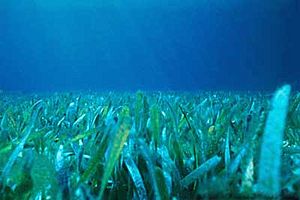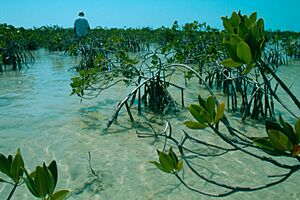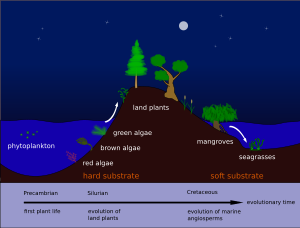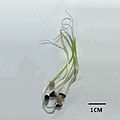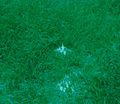Seagrass facts for kids
Sea grasses are amazing flowering plants that live completely underwater in the ocean. They are a special type of plant that grows in salty ocean water. You can find them in warm, subtropical places like Florida Bay and around Bermuda.
Sea grass beds are super important parts of the continental shelf ecosystems. They are like underwater meadows! Many different species of animals live in these seagrass beds. Eating sea grass is a very important part of the food chain for many ocean creatures. For example, green turtles, dugongs, manatees, fish, geese, swans, sea urchins, and crabs all munch on sea grasses.
Contents
What Are Sea Grasses?
Sea grasses are unique because they are the only flowering plants that can live fully submerged in salty ocean water. They have roots, stems, and leaves, just like plants on land. They even produce flowers and seeds underwater!
These plants help keep the ocean healthy in many ways:
- They provide food and shelter for lots of marine animals.
- They help clean the water by trapping dirt and tiny particles.
- Their roots help hold the sand and mud in place, stopping erosion.
- They help fight climate change by storing a lot of carbon.
Types of Sea Grasses
There are many different kinds of sea grasses around the world. Scientists group them into four main families. Each family has different types, or genera, of sea grasses.
Zosteraceae Family
This family is also called the seagrass family. It has 22 different species of marine plants. You can find them in both temperate and subtropical coastal waters. They are most diverse around Korea and Japan.
- Phyllospadix: This group has 6 species.
- Zostera: This group has 16 species.
Hydrocharitaceae Family
This family is known as tape-grasses. It includes plants like Canadian waterweed. While some plants in this family live in fresh water, three species live in the ocean. They are found all over the world, especially in tropical areas.
- Enhalus: This group has 1 species.
- Halophila: This group has 19 species.
- Thalassia: This group has 2 species.
Posidoniaceae Family
This family is mostly found off the coast of Australia.
- Posidonia: This group has between 2 and 9 species.
Cymodoceaceae Family
This family is also called the manatee-grass family. All the species in this family live in the ocean.
- Amphibolis: This group has 2 species.
- Cymodocea: This group has 4 species.
- Halodule: This group has 6 species.
- Syringodium: This group has 2 species.
- Thalassodendron: This group has 3 species.
Images for kids
See also
 In Spanish: Pradera marina para niños
In Spanish: Pradera marina para niños
 | Calvin Brent |
 | Walter T. Bailey |
 | Martha Cassell Thompson |
 | Alberta Jeannette Cassell |


